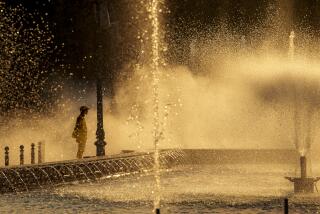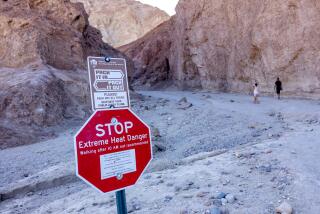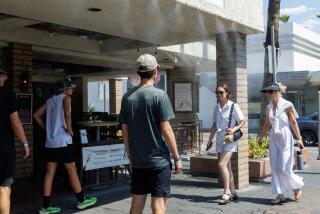Europeans All Hot and Bothered by Unusual Weather : Heat wave: Farmers fret about crops, and beer sales are up. Northern Asia is also baking.
- Share via
BERLIN — Usually, when people complain about the weather in this part of the world, they run on about gray skies, chills and a winter that never seems to end.
But now that much of Europe--as well as northern Asia--is in the midst of the worst heat wave in modern times, everybody from Korean rice farmers to Polish clergy are complaining about too much sun, too much heat, not enough rain.
The only ones not longing for the gloomy days of winter, it seems, are German vintners: The blazing sun has made the grape crop here ripen so fast that the harvest will be four weeks early.
“This is the best it’s been for grapes in southwestern Germany in many years,” said Norbert Schindler, president of the Vintners’ Assn. for the German state of Rhineland-Palatinate. “This will be the vintage of the century, just like 1976.”
Germany nearly broke its national record of 104.4 degrees last month when the temperature hit 103.8 in the eastern town of Preschen. This summer, Britain has racked up a record 197 hours of sun, sans rain. Tokyo set a new high of 102 degrees on Wednesday, while seven other Japanese cities posted records of their own. On Friday, an unmanned measuring station in the Japanese city of Tenryu noted a temperature of 105 degrees.
In Europe, the results of all this heat and light have included melting roads and railroad tracks, the fainting of 40 guests at a Buckingham Palace garden party, an increase in deaths by drowning and a continent-wide shortage of electric fans.
“You won’t find one in all of Europe,” said one fan company executive.
In Japan, air-conditioner sales tripled in July, and some store inventories have been wiped out. Japanese beer sales are up 20%.
In Sweden, psychologist Curt Johanssen said it’s too hot to think straight and warned, “In temperatures above 81 degrees, it’s difficult to concentrate on anything.”
Fittingly, in Berlin, employees of the Amerika Gedenk Bibliothek, a library, are being given hitzefrei --special time off for heat relief, a privilege usually enjoyed only by children.
In Poland, soldiers who marched in recent ceremonies commemorating the 50th anniversary of the Warsaw Uprising, wearing heavy uniforms and leather gloves, dropped like a row of dominoes. This so alarmed Cardinal Josef Glemp, who was officiating at an outdoor Mass for the occasion, that he took the unusual steps of letting men wear hats and encouraging the faithful to remain seated during the reading of the Gospel.
Also in Poland, and in the Czech Republic, trains are being run at just 37 m.p.h. between noon and 8 p.m.--after officials noticed that tracks were bending in the heat when trains passed over them at higher speeds.
In Denmark, shoppers are being told to take thermometers to the supermarket to ensure that store refrigerators are keeping food fresh. And Danish social workers are blaming the heat wave for a 30% increase in children being left behind in bars by drunken parents.
In Brugge, Belgium, male inmates have complained that female prisoners are compounding their 87.9-degree heat-induced misery by sunbathing topless.
German prisoners haven’t had anything quite so interesting to complain about: Prison officials in this country have offered inmates relief in the form of unlimited tea and drinking water; in Saarbruecken, prisoners are being allowed to have the food-tray slots in their cell doors left open longer than usual, just so some air can blow in.
About 15,000 Scandinavians have canceled vacations to Greece this summer, apparently because the North and Baltic seas are warm enough for bathing. Normally, the Baltic is so chilly that swimmers are known to wear bodysuits even in August; this summer, the water has risen to 73 degrees, and resulting algae blooms are making some swimmers break out in a rash.
Water levels in Central European lakes and reservoirs are still comfortably high, thanks to heavy spring rains. But the level of the important Elbe River has plunged, causing many ships to get stuck on their way from the Czech Republic to the North Sea.
And Japan--which scientists say is caught in the same circular belt of warm air as Northern Europe--is experiencing such severe water shortages that 235 cities and towns have begun rationing. Tokyo’s supply has been cut by 10%.
In Europe, water temperatures in lakes and rivers have risen so high that scientists say many species of freshwater fish are at risk. Already, the Rhine is 78.8 degrees.
“That’s extremely high,” said Paul Hagel, vice director of the Dutch Fishery Institute. “With temperatures over (86) degrees, most types of fish die in our bodies of water. The normal temperature for this time of year would be around (68) degrees.”
Officials in southern Poland have reported large numbers of dead fish in rivers flowing from the Carpathian Mountains; fish farm workers have had to destroy seven tons of trout at just one overheated northern German lake.
To limit such fish kills, German utilities have been shutting down generating stations; otherwise, their coolant water would make the warm rivers even hotter.
In the Netherlands earlier this week, power companies called on citizens to use as little electricity as possible from 6 a.m. to 5 p.m. But locals didn’t change their habits, so now the power plant in Rijswijk, near The Hague, has issued a threat: If customers don’t cut energy consumption by Monday, the utility will turn off the power for one district each day.
The heat in Europe and Asia is creating havoc for farmers. Apples and plums are already falling off trees, even though they aren’t yet ripe. Potato and corn crops are stunted. Sugar beets have collapsed.
In South Korea, rice paddies have dried up and drought has become such a political issue that President Kim Young Sam recently appeared on television passing out buckets of water and spraying a parched rice paddy.
Times staff writers Sam Jameson in Tokyo, Scott Kraft in Paris, Dean E. Murphy in Warsaw, William Tuohy in London, Carol J. Williams in Ancona, Italy, and special correspondent Janet Stobart in Rome contributed to this report.
More to Read
Sign up for Essential California
The most important California stories and recommendations in your inbox every morning.
You may occasionally receive promotional content from the Los Angeles Times.










